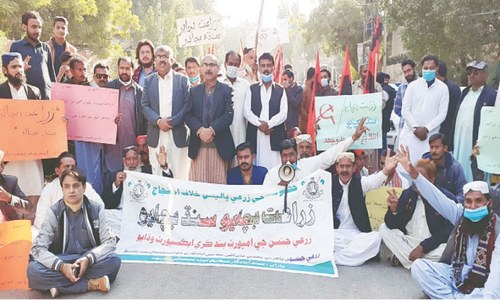HYDERABAD: The perennial price uncertainty associated with the perishable tomato crop is affecting both growers and consumers alike.
Tomato consumers are forced to pay high prices due to demand and supply imbalances, while farmers suffer when imports are allowed to stabilise market prices.
Cultivation of the tomato crop is now difficult for farmers like Suraya Lashari, owner of a small piece of land in Mirpur Sakro, Thatta. She concedes getting fair returns, but prices can fall drastically that may leave her hugely disappointed.
“As prices fall we let the cattle graze tomato fields or even plough the land while the crop is still there as picking then becomes a burden,” she laments.
Imran Bozdar, a relatively big landowner from Sanghar, agrees with her.
Tomato has back-to-back crop cycles in Sindh and remains available in the market almost round the year. According to him, consumers suffer when prices go beyond their reach while farmers are at the losing end when rates plummet due to the vegetable’s import.
Sindh is the largest tomato-producing province as the average of three years (2015-16 to 2017-18) shows that it had 34.5pc share in the country’s total tomato production (600,000 tonnes) followed by Punjab with 18.4pc, said a provincial agriculture official quoting Pakistan Bureau of Statistics figures.
Early tomato cultivation and production takes place in Mirpur Khas, Badin and Tando Mohammad Khan districts. The crop is harvested in October there while Tando Allahyar, Matiari, Hyderabad and Thatta harvest the crop by late Feb to April.
“In January we got a price of Rs20-Rs25 per kg, but it dropped to Rs10. We are not harvesting the crop as picking charges are unnecessary cost given the price trend. At times we pay transport charges without earning anything,” laments Naseema, Suraya’s neighbour.
Last year in September, torrential rains considerably damaged the crop in Mirpur Khas although it was to be harvested in October. The area where crop survived rains was marketed amidst shortage, forcing the government to allow imports in November.
“In October the rate was as high as Rs130 per kg in the mandi due to demand and supply phenomenon. Excluding Rs30 per kg cost of production, the luckiest among farmers saved Rs800,000 (100 bags of 10kg produce from an acre in multiple pickings). Consumers did pay Rs200 per kg”, Bozdar says.
“The other side of the story is that now I am unable to even recover my production cost. I am not harvesting the crop and instead allowing anyone who might want it to get it from my land or I will use it as organic matter during ploughing of land,” he says.
The glut in market was for three reasons. Those who lost the crop to the rains went for late sowing and the crop from areas like Hyderabad, Tando Allahyar, Matiari and Thatta where it is sown late reached the market last month. Then imports continued till January.
Expenses on tomato cultivation vary between Rs120,000- Rs130,000 per acre depending on price of key inputs like imported hybrid seeds at a cost of Rs15,000 to Rs20,000, ploughing, picking, transport of produce to market, etc. A commission agent charges 8pc-10pc fee to fix auction rate in the commodity market. Retail vendors then add their cost for consumers depending on locality where a market is located.
Rozi Khan, a wholesaler in Mirpursarkro, claims growers who got land on a contractual basis to produce tomato have borne a cumulative loss of Rs18 million between January-March. “Imports from Iran led to declining price trend. I guess there will be a win-win situation for consumers and growers if wholesale price stays between Rs50-Rs60 per kg,” he says.
Way forward?
According to Mehmood Nawaz Shah, vice president of the Sindh Abadgar Board (SAB), roughly imports of tomato worth billions of rupees is seen this season.
“Tomato is a perishable and sensitive crop; therefore we should go for value addition through research to ensure a sustainable income for farmers and price stability in the market,” he says.
He also wrote to the Ministry of National Food Security in Dec 2020 that food security could only be ensured through viable domestic tomato production thus imports must be stopped.
All Pakistan Fruit, Vegetable and Merchants Association Patron-in-Chief Waheed Ahmed points out that tomato in Pakistan lacks quality that is to be used for value addition. “I myself producing tomato paste but its not competitive internationally,” he admits.
He calls for varietal change and given climate change phenomenon we also need to see whether we can protect it against rains which are seriously detrimental for this sensitive crop. We should also find alternate places where tomato can be grown to avoid rains in summer otherwise rains are permanent phenomenon,” he argues.
Research is needed, he says, to come up with those seeds that have shelf life and produce quality paste through processing.
Published in Dawn, March 28th, 2021














































